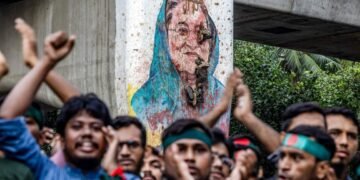In the past, its tighter scrutiny of Chinese investments would ease if the border stand-off moved towards resolution; New Delhi
- Border pact to help resolve four-year conflict, India says
- Pact follows rounds of military, diplomatic talks
- Modi, Xi could meet on sidelines of this week’s BRICS summit
- Border stand-off strained ties, hit business interactions
Indian army soldier stands on a snow-covered road near Zojila mountain pass that connects Srinagar to the union territory of Ladakh, bordering China on 28 February 2021AFP
India and China have reached a deal on patrolling their disputed Himalayan frontier to resolve a four-year military stand-off, foreign secretary Vikram Misri said on Monday, paving the way to normalise political and business ties.
The news comes on the eve of Indian prime minister Narendra Modi’s visit to Russia for a summit of the BRICS regional grouping from 22 to 24 October, during which he could hold talks with Chinese president Xi Jinping, Indian officials said.
Diplomatic and military negotiators from the nuclear-armed neighbours had held several rounds of talks during the past few weeks, said Misri, the top bureaucrat in India’s foreign ministry.
The talks yielded an agreement on “patrolling arrangements along the Line of Actual Control in the India-China border areas,” he told reporters at a briefing on Modi’s visit to Russia.
The pact could lead to disengagement of the troops of both countries in the remote mountainous region, and help resolve issues that had arisen there in 2020, Misri added.
Authorities in Beijing offered no immediate response to Misri’s remarks.
Ties have been strained since clashes between their troops on the largely undemarcated frontier left 20 Indian and four Chinese soldiers dead in 2020.
Asked if Modi and Xi would hold talks this week, Misri said the prime minister’s bilateral meetings on the sidelines of the BRICS summit in Russia’s southwestern city of Kazan were still being planned.
Slow progress during talks over the last four years to end the standoff hurt business ties between the world’s two most populous nations, with New Delhi tightening scrutiny of investment by Chinese firms and halting major projects.
This month, India’s army chief said New Delhi wanted the status on the frontier in the western Himalayas restored to the position before April 2020, when the stand-off began and warned the situation would stay sensitive until that was achieved.
The two sides need to tackle difficult issues beyond the “low-hanging fruit” already grasped, said general Upendra Dwivedi, adding that “positive signalling” by diplomats required the military commanders of both to follow through on the ground.
India’s tougher vetting of all Chinese investment after the clashes has effectively turned away billions of dollars from the likes of carmakers BYD and Great Wall Motor, and added more red tape in Indian firms’ interactions with Chinese stakeholders.
However, Indian imports have surged 56 per cent since the border clash, nearly doubling New Delhi’s trade deficit with Beijing to $85 billion. China remains India’s biggest source of goods and was its largest supplier of industrial products last year.
BRICS, originally comprising Brazil, Russia, India, and China, has expanded to include South Africa, Egypt, Ethiopia, Iran, and the UAE.








































































